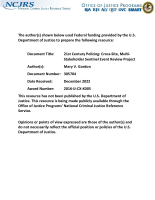Law enforcement organizations
Human Trafficking Data Project
Labor Trafficking in Construction and Hospitality Survey Findings: New York
Labor Trafficking in Construction and Hospitality Survey Findings: Summit County
Labor Trafficking in Construction and Hospitality Survey Findings: Denver
Labor Trafficking in Construction and Hospitality Topical Brief: Immigrant Workers
Labor Trafficking in Construction and Hospitality Topical Brief: Barriers to Help-Seeking
Advancing Justice for the Missing and Unidentified Through Research - 2024 NIJ Research Conference
Forensic science research is developing essential knowledge to fill in the holes in death investigations, creating new ways to identify challenging skeletal remains. These methods inform cause of death, time of death, and familial relationships to guide investigations, identify suspects, support prosecutions, and bring justice to families.
See the YouTube Terms of Service and Google Privacy Policy
Celebrating 10 Years of NIJ’s Law Enforcement Advancing Data and Science (LEADS) Scholars Program - 2024 NIJ Research Conference
In 2014, NIJ established the Law Enforcement Advancing Data and Science (LEADS) Scholars Program to support research-minded, mid-career sworn law enforcement officers working to integrate research into agency policy and practice. The LEADS Scholars Program helps participants develop independent research and provides support to identify current evidence on priority issues.
See the YouTube Terms of Service and Google Privacy Policy
Exploring the Nexus of Human Trafficking and Drug Trafficking in a Border County
Forensic DNA Interpretation and Human Factors: Improving Practice Through a Systems Approach
Overcoming Recruiting Shortages by Applying Industrial and Organizational Psychology Practices
Discouraging the Demand That Fosters Sex Trafficking: Collaboration through Augmented Intelligence
Internal Affairs Complaint Investigations: A Multi-Site Comparison
Examining Intersections between Law Enforcement and Victims
Digital Transformation of Cold Case Reviews: The Application of Text Analytics
Campus Sexual Assault Responses (CSAR): Informing Trauma-Informed Policies, Protocols, and Training
Sexual violence is a significant criminal justice problem with long-term effects for its victims. In particular, sexual assault on or related to college campuses across the United States presents a growing public health and economic burden, starting with significant impacts on academic outcomes.
See the YouTube Terms of Service and Google Privacy Policy
Furthering understanding of forensic units: a detailed examination of Knoxville police department's crime scene unit
21st Century Policing: Cross-Site, Multi-Stakeholder Sentinel Event Review Project
Mass Attacks Defense Toolkit: Preventing Mass Attacks, Saving Lives
What's Possible with Rapid DNA Technology?
NIJ scientist Tracey Johnson joins science writer Sarah Michaud in this episode. They discuss Rapid DNA technology, and Tracey explains the complexities of this technology – its pitfalls and its possibilities.
Reading and Resources from NIJ:




